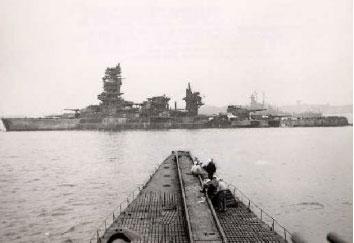Montana

So, as the mighty battleship rode at anchor outside the breakwater in the Sagami-wan, it is time to talk about how important the little man I first met in my impromptu tour of the battleship. I considered him an apparition of the ship, which clearly was haunted by the history of what she had done as part of the attack on Pearl Harbor. The cultural side of the international cooperation was furnished by Y. Matano, the electrical engineer and one of the resident ghosts of Nagato.
Matano-san somehow emerged as the vital middle-man between the Americans and the Japanese workers who were brought aboard each day to help prepare us for the long voyage to the Marianas for the demonstration of the power of the atom. He was a muscular little man of about forty, with bulging spectacles. He wore an armband signifying rank, but was otherwise dressed like the others in mustard fatigues and black split-toed shoes that made me think of the feet of frogs. There was nothing perfunctory about the services rendered; he loved work, accomplishment and discipline for their own sake. With us on Nagato, he was just as happy with us as he had ever been under the Emperor.
I would judge that he probably found one naval officer quite like another, regardless of national origin: all of us unreasonable and inconsistent, and all completely comfortable in imposing impossible tasks on him and his workers. That notwithstanding, we developed a mutual liking and understanding which smoothed over many difficulties between our cultures, and I am sure he was as sorry when we sailed south as I was to lose his services.
To the men he was simply know as “Montana,” and he was as integral a part of the ship as the great guns. He had the run of the place, and was occasionally useful as an interpreter. In view of the strict rule that no American food could be given to the Japanese, it was astonishing how the old man fattened on air.
A carefully lettered sign “Y. Matano, Office and Quarters” had appeared over one of the hatches when I paid a visit down there one day. He had a desk, a cot and blankets in a spot close enough to the boilers to be cozy. Much of his time he spent lettering signs in English or Japanese, as requested, and much of the rest inscribing “memorials” to me, of which the following are samples:
NECESSITY OF SHIP’S BOAT
On Sunday, Monday, Tuesday & Wednesday (today), I saw at the Officer’s Landing (from where those Jap workmen come up in the morning) the following:
Boat situation is getting day by day harder, and, if the ship wants to have them on board at fixed time, punctually, in every morning, then the ship should have her own BOAT to them at the Officer’s Landing, sending every morning their big size Boat , while she wants them before her leave. If the Ship relies on the efforts of the Yard Crafts Office, the Ship will not have them at the fixed time every morning. They are waiting for Boat, from 7:30 every morning, at the said Landing point, wasting 2-3 hours without working.
The necessity of checking-up with regards to the GUARD who take charge in these jap workmen. For an example, this morning he came down to the GATE to take them in, just at about 9:00. He used to appear at the GATE at 7:50 to 8:00, formerly. The action of their GUARD, from the GATE to the Landing (where he gets boat for them) and the carrier-BOAT are 2 important factors.
JAP WORKMEN STOLEN
According to the jap foreman, some of those jap workmen have been stolen from their money and watch, on board the Ship. And it is likely to be “many cases.” This is causing a kind of consternation in their morality.
If it be so, I hope that the Ship’s side takes it into consideration, MODERATELY. A satisfactory result will not come from an abrupt measure.
To the men of our pirate crew, having Matano around seemed perfectly natural. They treated him with the same affectionate fondness formerly bestowed on an old, dependent Uncle George in their own homes.
To the Japanese foreman, there was nothing mysterious about either officers or crew; they were just like all the other naval people he had known. But to Matano, man of the world, the whole Nagato episode was a seething turmoil of contradictions.
Loving this ship, he was glad to see her active again, but distressed that an enemy should tend her holy decks.
He was a devotee of rules and adherence there to, but glad to see rules broken in his favor. He was loyal to his fellow Japanese, but in minor disagreement he was continually finding that the Americans were right. He found himself coming to like Americans whom he ought to hate. What really burned him up, though, was that the American government should pay his daughter more than it paid him. He couldn’t understand why.
I did not tell him that to the young men of the American Fleet so far from home, there was something his daughter could offer them that he never could.
Copyright 2015 Vic Socotra
www.vicsocotra.com
Twitter: @jayare303
